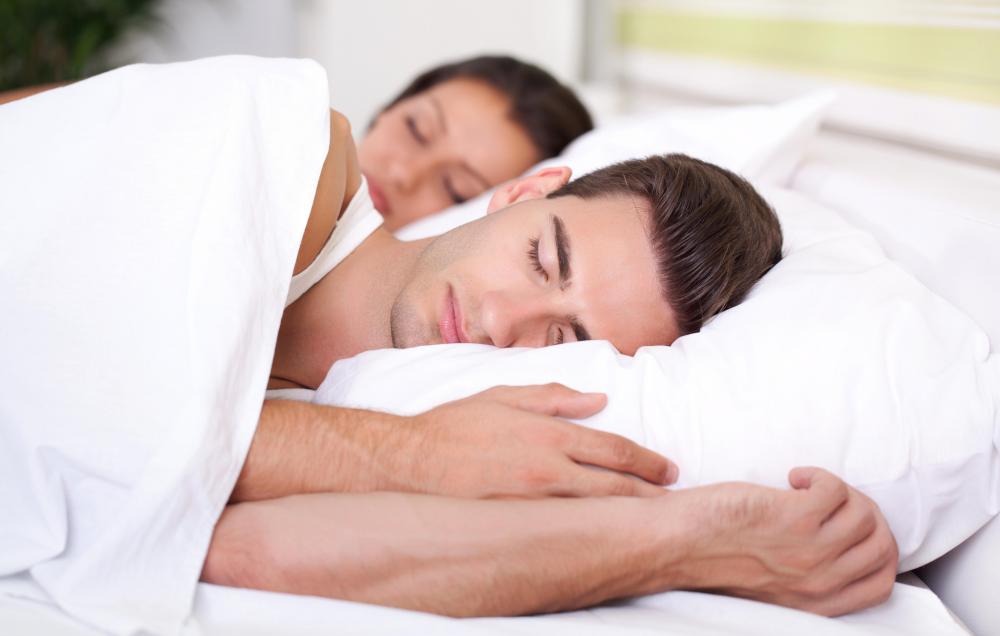At WiseGEEK, we're committed to delivering accurate, trustworthy information. Our expert-authored content is rigorously fact-checked and sourced from credible authorities. Discover how we uphold the highest standards in providing you with reliable knowledge.
What Does a Sleep Technologist Do?
A sleep technologist is a professional responsible for monitoring patients while they sleep. These individuals are also called polysomnographic technicians or sleep technicians and may work in doctors' offices or hospitals, but are usually located at specialized outpatient sleep clinics. Such technicians monitor a number of patient sleep activities and tests in order to help diagnose sleep disorders. They can obtain certification through formal training programs or be trained on the job.
The primary purpose of sleep testing is to diagnose patients with sleep disorders, such as sleep apnea. Sleep disorders often result in lack of proper rest and can severely affect an individual's daily life. Some disorders can cause or contribute to ongoing, serious and potentially fatal health concerns. This being the case, the work performed by a sleep technologist is extremely important to providing quality care.

Working in a specialized sleep clinic, or within a sleep-testing unit of a hospital or doctor's office, a sleep technologist will explain the testing process to the patient and set her up in the test environment. This usually includes attaching electrodes at various specific points on her body so that her heart rate, brain activity, oxygen usage and other similar functions can be measured. It also involves ensuring that the patient is as comfortable as possible so that her sleep will be as natural as possible.

During testing, the sleep technologist will monitor all devices connected to the electrodes. She will also watch and record body movements and incidences of snoring. With training and experience, she will be able to identify and record sleep stages and symptoms of sleep disorders. Experienced technicians may be trained to interpret test results and diagnose disorders, but these functions often require the involvement of a doctor or other advanced practitioner.

Some technical colleges and private training programs offer certificate-level courses in polysomnography. While not all facilities require this formal training, they may favor candidates who have it. Some facilities, on the other hand, prefer to hire sleep technologists who can be trained on the job according to facility practices.
In most cases, sleep technologists work overnight shifts. This is because nighttime is the natural time for patients to be asleep, and conducting testing at this time provides the most accurate results. It is also not unusual for a technician to work a ten-hour shift, as this often provides the most efficient scheduling plan for the facility.
AS FEATURED ON:
AS FEATURED ON:













Discussion Comments
@mobilian33 - My aunt has a lot of health problems, and she has problems sleeping most nights. She recently had a sleep study done on her to figure out what she needs to do for a better night's sleep. Before the test, I was talking to one of her technicians at the sleep center, and I learned that they make a good salary, so I'm sure this makes the challenge of staying awake that you talked about worthwhile.
I also learned that once they reach a certain level in their profession and they get the needed certifications sleep technologists can work almost anywhere in the world. So if you like to travel, this could be a good profession to get into.
@Animandel - I bet staying awake when you are a sleep technologist is very hard to do. According to the article, these people who work in this profession often work long shifts. This alone is enough to wear you out and make you want to take a nap.
Then on top of the long hours they work, they have to watch other people sleep while they are working. I get sleepy when I see someone near me yawn, let alone, trying to stay awake while watching someone else sleep. That sounds like torture to me.
Last week, I saw one of my old friends from high school. We were really close back when we were teenagers, but we had gone more than 15 years without seeing one another before I bumped into her at the store the other day.
When we were catching up she told me she was working as a sleep technologist. She didn't get a chance to explain to me exactly what a sleep technologist does, but she did tell me that the hardest part of her job sometimes was trying to stay awake.
Post your comments